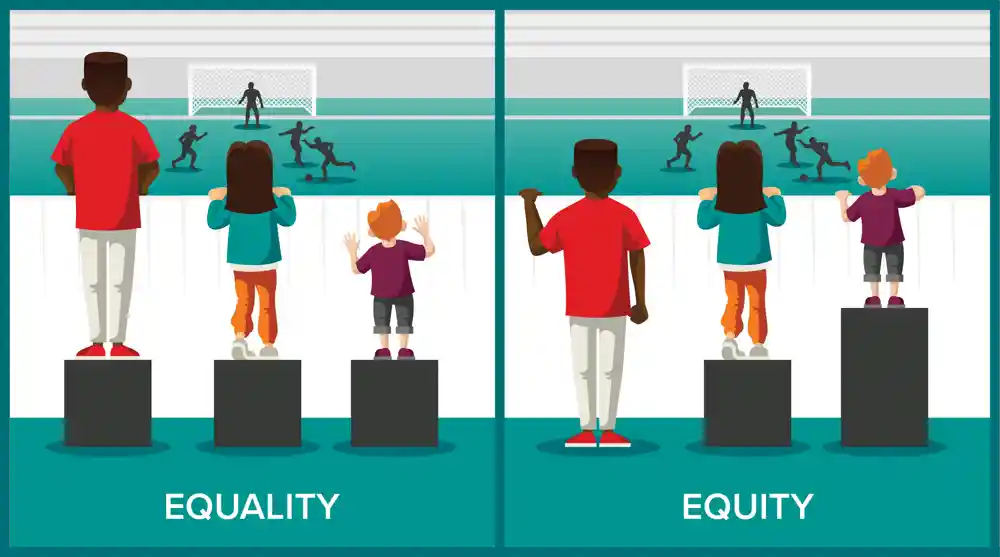The Crucial Distinction: Understanding the Difference Between Equity and Equality
14th May 2024

In the pursuit of a just and fair society, two concepts are often intertwined: equality and equity.
While they share similar goals, they differ significantly in their approaches and outcomes. Equality focuses on treating everyone the same, whereas equity aims to address the unique needs and barriers faced by diverse individuals and groups. Understanding the distinction between these two concepts is vital for creating a truly inclusive and just environment.
N.B. The language of EDI is constantly evolving. That's why it's so important to run your EDI Survey using a platform like Diversity that can constantly evolve the questions to ensure insight without insult.
Equality: The Foundation of Fairness
Equality is about providing the same opportunities, resources, and treatment to all individuals, regardless of their backgrounds, identities, or circumstances. It is based on the principle that everyone should have an equal chance to succeed, with no one facing discriminatory barriers or biases. Equality is essential for fostering a sense of fairness, justice, and social cohesion.
In an egalitarian society, equality might manifest in various ways, such as:
- Equal access to education: Every individual has the same opportunity to receive quality education, regardless of their socio-economic background.
- Equal pay for equal work: Men and women are paid the same salary for performing the same job, eliminating gender-based wage disparities.
- Equal voting rights: All citizens have an equal say in the democratic process, with no one's vote carrying more weight than another's.
Equity: The Path to True Inclusion
Equity, on the other hand, recognizes that not everyone starts from the same place or faces the same challenges. It acknowledges that historical and systemic inequalities have created disparities in opportunities, resources, and outcomes for marginalized groups.
Equity seeks to address these imbalances by providing targeted support, accommodations, and opportunities to level the playing field.
In an equitable society, equity might manifest in various ways, such as:
- Affirmative action programs: Initiatives that provide additional support and opportunities to underrepresented groups, such as racial minorities or women, to counterbalance historical disadvantages.
- Accessibility accommodations: Providing tailored support, such as wheelchair accessibility or language services, to ensure equal participation for individuals with disabilities or linguistic barriers.
- Culturally responsive education: Curricula and teaching practices that acknowledge and value diverse cultural backgrounds, promoting inclusive learning environments.
Key Differences Between Equality and Equity
While equality focuses on sameness, equity prioritizes fairness and justice. The primary differences between the two concepts are:
- Treatment vs. Outcome: Equality emphasizes equal treatment, whereas equity concentrates on achieving equal outcomes.
- One-size-fits-all vs. Tailored Approach: Equality often adopts a uniform approach, whereas equity recognizes the need for tailored solutions to address diverse needs and barriers.
- Focus on Sameness vs. Focus on Difference: Equality stresses the importance of sameness, while equity acknowledges and values differences, seeking to create a more inclusive environment.
Privilege Walk
I heard a great story about a workshop at Facebook which brings to life the difference between equality and equity. (Turns out this is called a Privilege Walk
Participants were asked to line up next to each other (equality). The moderator then read out a sequence of statements:
- "If one or both or your parents has a university degree, take a step forward"
- "If English is your first language, take one step forward."
- "If you or your family never had to move due to financial issues, take a step forward"
- "If you are physically able to take a step forward or backward, take two steps forward."
- "If people in the UK rarely get your name wrong and find it easy to remember, take a step forward."
- etc.
After all the questions have been read, the first one to reach the finish line is the winner...
Conclusion
In conclusion, equality and equity are complementary concepts that together can create a truly just and fair society. While equality provides the foundation for fairness, equity addresses the complexities and nuances of diverse experiences, ensuring that everyone has an equal opportunity to thrive. By understanding and embracing both concepts, we can work towards a future where everyone has access to the resources, opportunities, and support they need to succeed.
More Blog Articles
- Since we're asking such personal questions, learn how Divrsity is Obsessed with Anonymity
- Caring Responsibilities are a super-interesting dimension of our surveys
- How does the Divrsity AI work?
- Use Collective Surveys to survey employees who don't work at a desk
- Learn why we created Divrsity
- Or explore one of the articles in our Diversity Dictionary Series:
Intersectionality,
Ableism, and
Transgender